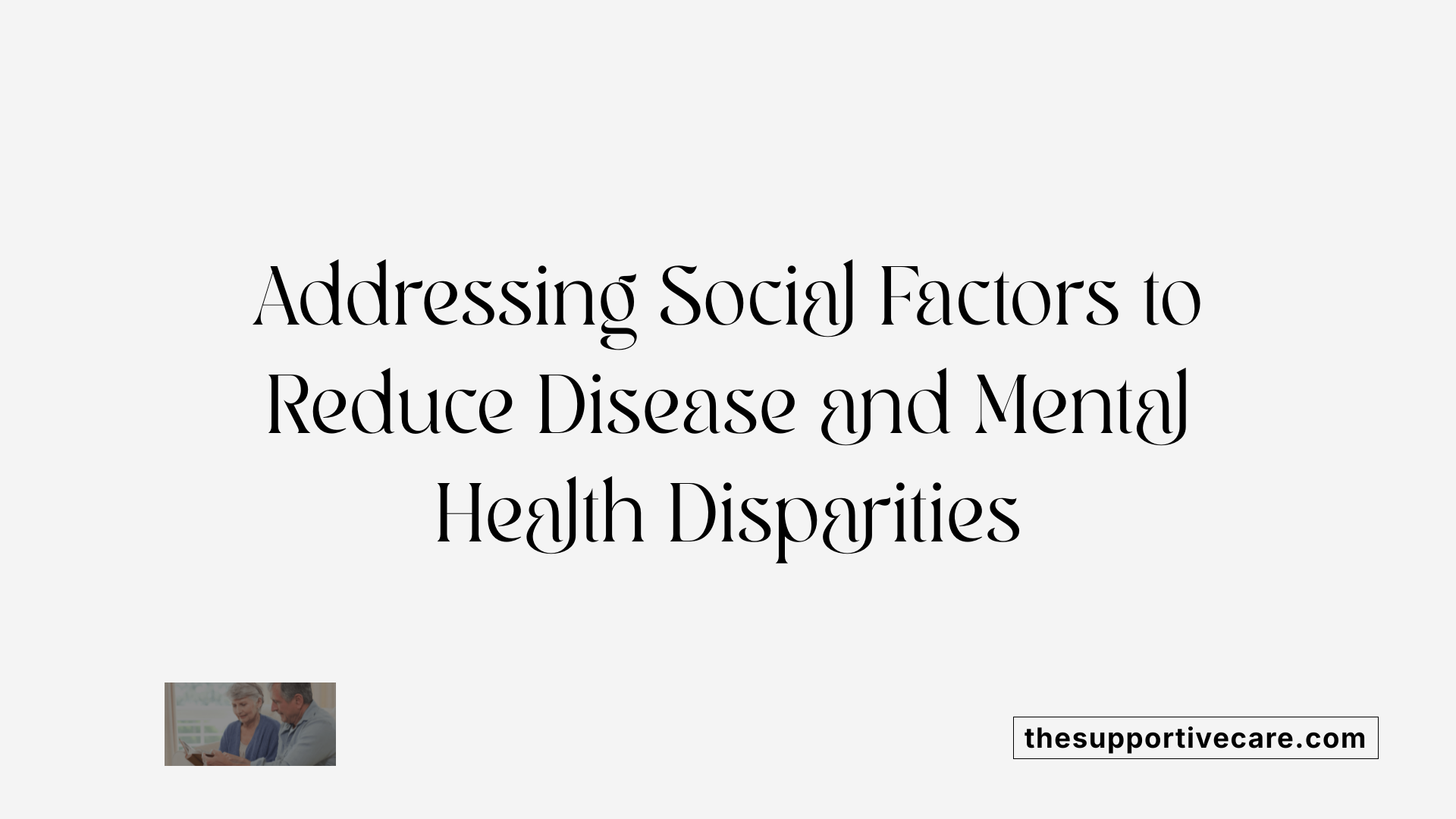The Critical Link Between Physical and Behavioral Health
As the prevalence of chronic diseases continues to rise globally, understanding the complex relationship between physical health and behavioral health has become more crucial than ever. This article explores the interconnectedness of chronic illnesses and mental health issues, shedding light on how behaviors influence disease progression and outcomes. By examining integrated healthcare approaches and the impact of social determinants, we aim to provide a comprehensive overview of strategies to improve patient well-being and health outcomes.
The Interplay Between Chronic Disease and Mental Health
What is the relationship between chronic diseases and behavioral health?
Chronic diseases such as heart disease, diabetes, and cancers are closely linked with behavioral health factors. Lifestyle choices like smoking, unhealthy diets, physical inactivity, and chronic stress significantly contribute to the development and worsening of these conditions. These behaviors can cause physiological effects such as endothelial dysfunction, increased inflammation, and insulin resistance, which promote disease progression.
Conversely, living with a chronic disease often increases the risk of mental health problems like depression and anxiety. The emotional burden of managing ongoing symptoms, the unpredictability of flare-ups, and the physical limitations can lead to feelings of hopelessness, frustration, and social isolation.
Evidence demonstrates that individuals with chronic illnesses frequently experience more days of poor mental health. Mental health issues, in turn, can impair self-care, medication adherence, and proactive disease management, leading to worse health outcomes. For example, diabetics suffering from depression tend to have poorer glycemic control, higher obesity rates, and more complications.
Addressing behavioral habits and mental health is vital to effective chronic disease management. By integrating strategies like smoking cessation, stress reduction, and mental health support, healthcare providers can improve both physical and emotional well-being. An approach that considers social determinants, emotional resilience, and behavioral change enhances the chances of successful long-term health outcomes.
In summary, the relationship between chronic disease and behavioral health is bidirectional. Better understanding and managing this connection through comprehensive care can lead to improved quality of life and reduced disease burden.
Impact of Behavioral Factors on Chronic Disease Progression

What is the impact of behavioral health factors like stress, sleep, diet, smoking, and alcohol on chronic conditions?
Behavioral health factors such as stress, sleep quality, diet, smoking habits, and alcohol consumption significantly affect the development and worsening of chronic diseases. For example, chronic stress can lead to systemic inflammation, hypertension, and insulin resistance, all of which contribute to conditions like heart disease and diabetes.
Poor sleep has been linked to obesity, hypertension, and metabolic disorders. When sleep deprivation becomes chronic, it impairs immune function and increases the risk of various health issues.
Diet plays a vital role, especially a high intake of ultra-processed foods and low consumption of fruits and vegetables, which are associated with higher risks of obesity, cardiovascular disease, and certain cancers. Conversely, a balanced diet rich in nutrients can offer protective effects.
Smoking is directly linked to mechanisms like endothelial dysfunction, promoting atherosclerosis and increasing the risk of cardiovascular diseases. Combining behavioral therapies like cognitive-behavioral therapy and nicotine replacement therapy can effectively support smoking cessation efforts.
Excessive alcohol intake is associated with liver disease, several cancers, and cardiovascular issues. Public health initiatives focusing on screening and behavioral interventions aim to reduce alcohol-related health risks.
Collectively, addressing these behavioral factors through community programs, policy changes, and education can prevent the initiation and progression of these diseases. Promoting healthy lifestyle changes—such as increased physical activity, improved nutrition, stress management, and smoking cessation—are cost-effective strategies that can significantly improve health outcomes.
It is essential to recognize that these behaviors are intertwined and often influenced by social determinants like socioeconomic status and environmental factors. Tackling behavioral risks through comprehensive, culturally sensitive public health approaches can bridge gaps between scientific evidence and practice, ultimately reducing the burden of chronic illnesses.
Overall, modifying behaviors related to stress, sleep, diet, smoking, and alcohol is crucial not only for prevention but also for managing existing chronic conditions, ultimately enhancing quality of life and reducing healthcare costs.
Integrated Approaches to Holistic Care

What are integrated healthcare approaches for managing both chronic diseases and behavioral health?
Managing chronic illnesses such as diabetes, heart disease, or autoimmune disorders effectively requires addressing both physical symptoms and mental health conditions like depression, anxiety, or stress. Integrated healthcare approaches are designed to provide coordinated, patient-centered care that combines mental health and primary care services.
These models often embed behavioral health professionals—such as psychologists or social workers—directly into primary care teams. This setup facilitates routine screening for mental health issues, brief behavioral interventions, and timely referrals for specialized treatment when needed.
Utilizing shared electronic health records and collaborative treatment planning ensures continuity and comprehensiveness of care. Evidence-based frameworks like the Collaborative Care Model promote multidisciplinary teamwork, measurement-based care, and population management strategies. These methods have been shown to improve health outcomes, reduce healthcare costs, and enhance patient satisfaction.
Efforts to implement integrated approaches also focus on increasing access, especially for vulnerable groups impacted by social determinants such as poverty, racism, and unstable housing. By addressing social and environmental factors alongside medical treatment, healthcare providers can help mitigate disparities and support holistic well-being.
While these models significantly improve the management of co-occurring physical and mental health conditions, systematic barriers—such as limited provider training and fragmented healthcare systems—must be tackled. Strengthening integration efforts involves policy support, workforce development, and ongoing research to refine best practices, aiming ultimately for equitable, comprehensive care for all individuals with chronic illnesses.
Social Determinants and Risk Factors in Co-occurring Conditions

How do social determinants and risk factors influence the intersection of chronic and behavioral health?
Social determinants such as poverty, education level, housing quality, and neighborhood environment play a crucial role in shaping both physical and mental health outcomes. These factors influence individual behaviors, including smoking, poor diet, physical inactivity, and stress management, which are linked to a higher risk of chronic diseases like diabetes, heart disease, and cancer.
Poverty and food insecurity can limit access to nutritious food, safe exercise environments, and healthcare services, creating barriers to effective disease management and mental health care. Discrimination, social isolation, and lack of social support exacerbate stress and mental health challenges, increasing vulnerability to depression, anxiety, and other mental illnesses.
Structural issues, including inadequate housing and neighborhood disadvantage, perpetuate cycles of disadvantage, elevating the risk for both physical and behavioral health conditions over time. These social factors often lead to lower health literacy, limited healthcare access, and disparities in treatment outcomes.
Addressing social determinants involves targeted policies aimed at improving housing conditions, reducing poverty, expanding access to education, and fostering social connectedness. For example, community programs that promote healthy lifestyles, social support networks, and equitable healthcare access can help break the cycle of disadvantage.
Incorporating social determinants into health strategies is essential for a comprehensive approach to health prevention and management. Successful interventions not only reduce disparities but also enhance the overall well-being of populations, decreasing the burden of co-occurring chronic and mental health conditions.
| Social Determinant | Impact on Health | Example of Intervention |
|---|---|---|
| Poverty | Limits resources for health care and healthy living | Financial assistance programs |
| Education | Influences health literacy and behaviors | Health education in schools |
| Housing | Affects safety, stability, and exposure to stressors | Affordable housing initiatives |
| Environment | Exposure to pollutants and safe physical activity spaces | Urban green space development |
| Social Support | Buffer against stress and mental health risks | Community support groups |
The Role of Mental Health Awareness and Support in Chronic Disease Management

Why is mental health awareness and behavioral health support important for individuals with chronic conditions?
Mental health awareness is crucial for individuals living with chronic illnesses like diabetes, heart disease, and autoimmune disorders. These conditions often bring emotional challenges such as sadness, anxiety, and stress. When mental health issues go unrecognized or untreated, they can worsen physical health outcomes.
Many patients with chronic diseases experience depression, which has been linked to poorer disease management, including worse glycemic control in diabetics and increased complications. Studies indicate that only about 25%–50% of diabetics with depression receive proper diagnosis and treatment, yet depression increases the risk of mortality by about 46%.
Supporting mental health through behavioral health strategies helps in multiple ways. It encourages better self-care, promotes adherence to treatment plans, and improves overall quality of life. Addressing mental health concerns reduces stigma, allowing patients to seek help without feeling ashamed.
Community and healthcare support systems play essential roles. Peer groups, counseling, and integrated care models promote emotional well-being. Early intervention, such as screening for depression and anxiety, can prevent escalation and lead to more effective management of both the physical and mental aspects of chronic diseases.
Incorporating behavioral health support into chronic disease care not only enhances individual health outcomes but also reduces overall healthcare costs. This integrated approach acknowledges the interconnectedness of mind and body, emphasizing that mental health treatment should be a fundamental component of managing chronic illnesses.
Ultimately, recognizing and supporting mental health in chronic disease management is vital for improving patient resilience, fostering supportive environments, and achieving better health for those affected.
Moving Forward with Comprehensive Care
Understanding and addressing the intersection of chronic disease and behavioral health is essential for advancing patient-centered healthcare. By integrating mental health services, tackling social determinants, and modifying behavioral risk factors, healthcare providers can significantly improve health outcomes, reduce disparities, and enhance quality of life. Continued research, policy reforms, and community engagement are vital to fully realize the benefits of a holistic approach that recognizes the complex, bidirectional relationship between physical and mental health. Emphasizing education, awareness, and collaborative care will pave the way for more effective management of chronic conditions and a healthier society.
References
- The Intersection of Mental Health and Chronic Disease
- Understanding the Link Between Chronic Disease and ...
- Co-occurring: Mental Health and Chronic Illness
- Understanding the Intersection of Public Health and ...
- Mental Health Awareness: A Spotlight on Chronic Conditions
- The Role of Behavioral Factors on Chronic Diseases ...
- At the Intersection of Mental Health and Chronic Disease


































































































